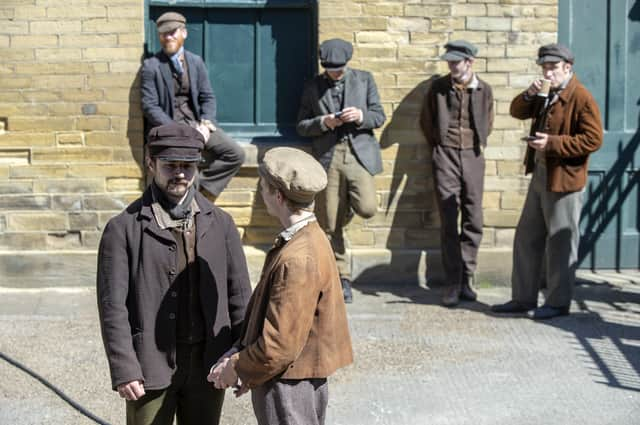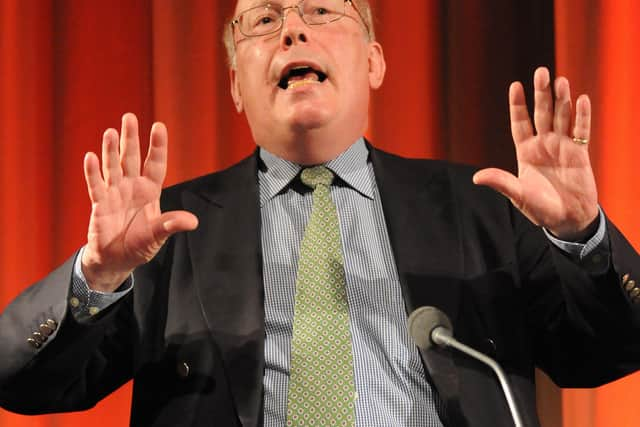Julian Fellowes scores major own goal with The English Game: Anthony Clavane


The coronavirus has produced a huge boost in viewing figures for the streaming service. For millions of us there are, suddenly, empty hours to fill, especially as live sporting events have ground to a halt.
In desperate need of a footballing fix I turned to Julian Fellowes’ six-part series The English Game. It’s about the birth of soccer – a word which has been denounced as “too American” but is, in fact, thoroughly British in origin – and its metamorphosis from a gentleman’s pastime to a professional sport dominated by the northern working-classes.
What’s not to love? Well, everything.
Advertisement
Hide AdAdvertisement
Hide Ad

For those looking for a bit of harmless, Downton Abbey-esque escapism during these scary times, it would appear to fit the bill. But football has, traditionally, been served poorly by televised drama and the big screen.
I have only to utter those three words Escape To Victory to certain friends and it is not long before they are breaking out into a sweat.
The Damned United was an entertaining portrayal of Brian Clough – but contained some laughable football scenes. Despite starring the Greatest Living Yorkshireman, Sean Bean, When Saturday Comes was risible. Mike Bassett: England Manager is peppered with self-indulgent in-jokes about Graham Taylor’s hapless reign as Three Lions boss.
And don’t get me started on The Match.
Of course, we will always have Barnsley. Or, should I say, Kes. The movie contained this country’s most celebrated sporting cinematic moment – the self-delusional, “slightly balding”, PE teacher Brian Glover providing a hilarious running commentary as he bullied his way through a rigged schoolboy game.
Advertisement
Hide AdAdvertisement
Hide AdThat, however, is the exception that proves the rule. The rule being that football dramas tend to be utter bobbins. And The English Game is a whole new level of utter bobbins.
Never mind fake news, this is fake history with fake accents and a whole host of fake football scenes.
First, fake football history. In order to drive the various plots, involving abusive fathers, love triangles and a northern town becoming the first working man’s team to lift the FA Cup, Fellowes and his fellow scribes have, to put it mildly, massaged the facts.
Fergus Suter is, indeed, widely recognised as the first professional footballer. But he did not move down south from Scotland with his mate, nor did he apply to join Darwen – he was headhunted – and he was a stonemason rather than a mill worker. These are three inventions; there are many more.
Advertisement
Hide AdAdvertisement
Hide AdThe biggest invention – and all ultra-patriotic England fans should look away now if they don’t want to know the score, I mean the truth – is the title. The series should not really be called The English Game. Suter was born in Glasgow and it was the Scots who, with their blend of dribbling and passing, devised the modern version of the People’s Game.
In fact, earlier versions of the sport can be traced even further back than the 19th century to China – and it became a folk activity across Europe from the late-medieval period.
Then there are the cringeworthy, “trouble at mill” accents from the downtrodden northern plebs – and the stilted, Ripping Yarns-style dialogue from an array of interchangeable toffs.
Finally, there are the fake football scenes. Now, the bar has been set pretty low here. And it is admittedly difficult to replicate all the excitement, goals and technical skills of an actual match.
Advertisement
Hide AdAdvertisement
Hide AdBut never in the field of screen soccer history has a drama looked less like the real thing.
Lord Fellowes was asked what, exactly, he liked about football in an interview with the Daily Mail. Referring to a Manchester United match, he replied: “A great friend of my wife’s was working at West Ham. East Ham? Which one is the football club? Anyway, we had lunch in the owner’s box, it was fascinating.”
An open goal – and he blasts the ball over the bar.
The series would, indeed, have been fascinating had Netflix hired a writer who knew something about the world’s greatest game.
Comment Guidelines
National World encourages reader discussion on our stories. User feedback, insights and back-and-forth exchanges add a rich layer of context to reporting. Please review our Community Guidelines before commenting.